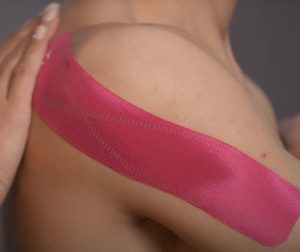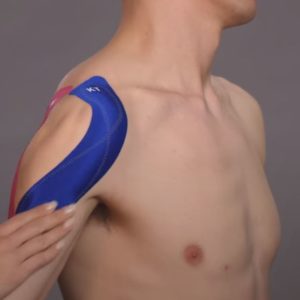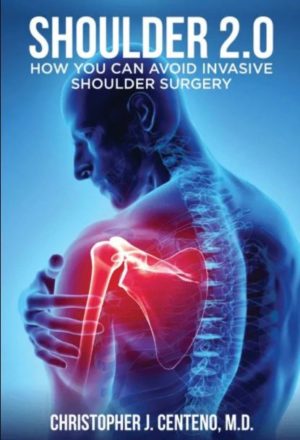Your shoulder keeps throbbing. It keeps you up at night and is getting worse. The earliest appointment for your doctor is in 3 weeks. What is KT Tape? What is KT tape used for? How does KT Tape help shoulder pain? How do you tape a shoulder? Does KT Tape really work? Is there a better option? Let’s dig in.
What Is KT Tape?
KT Tape is an elastic therapeutic strip tape with an adhesive backing that was developed by Dr. Kenzo Kase, a Japanese chiropractor in 1970 (1). It comes in multiple bright colors and is commonly seen on the arms, legs, and wrists of athletes during events and training. The elastic cotton tape can stretch up to 140% of its original length (2). This allows KT tape to have a much greater range of motion when compared to other athletic tapes.
What Is KT Tape Used For?
KT Tape is used for painful knees, hips, ankles, and shoulders during training and rehabilitation. KT Tape is used for many shoulder injuries including sprains, bursitis, and tendon injuries.
The proposed benefits of KT Tape include (3):
- Support damaged or weakened joint
- Decrease pain
- Reduce edema
- Increase blood flow
- Strengthening muscle weakness
How Does KT Tape Help Shoulder Pain?
Shoulder pain is a common musculoskeletal complaint. The prevalence of shoulder pain ranges from 7-36% (4). There are many different causes of shoulder pain which include arthritis, impingement, improper muscle balance, poor posture, rotator cuff injuries, and bursa inflammation. In the shoulder, KT tape is used principally to provide stability, support, and structural alignment. By providing stability, support, and neutral alignment, KT Tape is believed to improve pain and accelerate healing.
How Do You Tape a Shoulder with Kinesio Tape?
How to tape a shoulder with KT Tape depends upon the underlying injury. For example, the application of KT Tape for an injury of the rotator cuff would be different than any injury of the bicep tendon. A general shoulder application would be as follows.
How to apply kt tape to shoulder?
- Two strips of KT Tape are cut approximately 12 inches long.
- With arm down by your side, one end is placed as an anchor on the outside aspect of the shoulder.
- The affected arm is then stretched across the chest towards the opposite shoulder. The remaining tape is then firmly applied. See Figure 1.
- The second strip in applied immediately in front of the first strip in the arm in the neutral position.
Does KT Tape Really Work?
KT Tape has been used in a variety of ways for different types of injuries. The results vary but in general, are disappointing. For trapezius muscle pain KT Tape was shown to improve pain and muscle strength at one month (5). Unfortunately, there are a large number of different manufacturers and products. This complicates matters. A 2019 study found significant differences between tape brands in terms of strength, elasticity, and other physical characteristics. This puts into question the reliability of previous studies (6). Other studies are summarized below.
- 2012 meta-analysis found the efficacy of KT tape in pain relief was trivial with little evidence to support its use (7).
- 2015 in a review of 10 trials that examined the use of KT Tape for rotator cuff injuries found that while KT Tape improved pain-free range of motion there is no evidence to support its use in patients with rotator cuff injuries (8).
- 2015 study demonstrated that KT taping had no significant change in the strength of external rotation of the shoulder (9).
Is There a Better Option?
Yes! Identify the underlying cause of the shoulder pain or restriction. At the Centeno-Schultz Clinic, we are experts in the evaluation and treatment of shoulder injuries. New patient evaluations include a review of past medical history, physical examination, review of current imaging, and diagnostic ultrasound of the shoulder. Treatment options include PRP and stem cell injections. Our clinical outcomes are available for review here. These injections can not be performed by your PCP of an orthopedic surgeon. To see one of my ultrasound-guided shoulder injections please click on the link below.
In Conclusion
KT Tape is a brightly colored elastic therapeutic strip tape developed by Dr. Kenzo Kase. It is used extensively in the treatment of musculoskeletal injuries for both professional and recreational athletes. Its proposed benefits include support, reduction in pain and edema, and increased blood flow. By improving shoulder stability, support, and structural alignment (much like Vulcan shoulder support) it is believed that shoulder pain is reduced by KT taping. Regrettably, these claims are not supported by medical studies. A significant problem is the number of different manufacturers and products. Each of which has different physical properties.
A better solution is to identify and treat the underlying cause of shoulder pain. Treatment for shoulder instability is much different than the treatment of injured biceps tendons. Identify the underlying problem by having a complete examination and ultrasound of the shoulder. The physicians at Centeno-Schultz who are board-certified and fellowship-trained are experts in the treatment of shoulder pain. Do not waste your precious time as your small injury and pain progress. Schedule a Telemedicine consult with us where we can review your history, studies, and provide you with the best nonsurgical treatment option available. Your body is talking to you. Now is the time to listen and take action.
Related: AC Joint Impingement: What Is It and How is It Treated?
References
1.Mostafavifar M, Wertz J, Borchers J. A systematic review of the effectiveness of kinesio taping for musculoskeletal injury. Phys Sportsmed. 2012;40(4):33-40. doi:10.3810/psm.2012.11.1986
2.Thelen MD, Dauber JA, Stoneman PD. The clinical efficacy of kinesio tape for shoulder pain: a randomized, double-blinded, clinical trial. J Orthop Sports Phys Ther. 2008;38(7):389-395. doi:10.2519/jospt.2008.2791
3.González-Iglesias J, Fernández-de-Las-Peñas C, Cleland JA, Huijbregts P, Del Rosario Gutiérrez-Vega M. Short-term effects of cervical kinesio taping on pain and cervical range of motion in patients with acute whiplash injury: a randomized clinical trial. J Orthop Sports Phys Ther. 2009;39(7):515-521. doi:10.2519/jospt.2009.3072
4.Green S, Buchbinder R, Hetrick S. Physiotherapy interventions for shoulder pain. Cochrane Database Syst Rev. 2003;(2):CD004258. doi:10.1002/14651858.CD004258
5. Öztürk G, Külcü DG, Mesci N, Şilte AD, Aydog E. Efficacy of kinesio tape application on pain and muscle strength in patients with myofascial pain syndrome: a placebo-controlled trial. J Phys Ther Sci. 2016;28(4):1074-1079. doi:10.1589/jpts.28.1074.
6.Selva, F., Pardo, A., Aguado, X. et al. A study of reproducibility of kinesiology tape applications: review, reliability and validity. BMC Musculoskelet Disord 20, 153 (2019). https://doi.org/10.1186/s12891-019-2533-0.
7. Williams, S., Whatman, C., Hume, P.A. et al. Kinesio Taping in Treatment and Prevention of Sports Injuries. Sports Med 42, 153–164 (2012). https://doi.org/10.2165/11594960-000000000-00000
8. Desjardins-Charbonneau A, Roy JS, Dionne CE, Desmeules F. THE EFFICACY OF TAPING FOR ROTATOR CUFF TENDINOPATHY: A SYSTEMATIC REVIEW AND META-ANALYSIS. Int J Sports Phys Ther. 2015;10(4):420-433.
9. Alam S, Malhotra D, Munjal J, Chachra A. Immediate effect of Kinesio taping on shoulder muscle strength and range of motion in healthy individuals: A randomised trial. Hong Kong Physiother J. 2015;33(2):80-88. doi:10.1016/j.hkpj.2014.10.004



